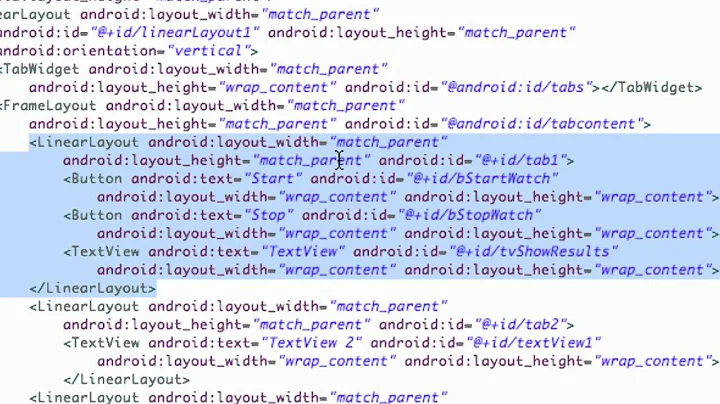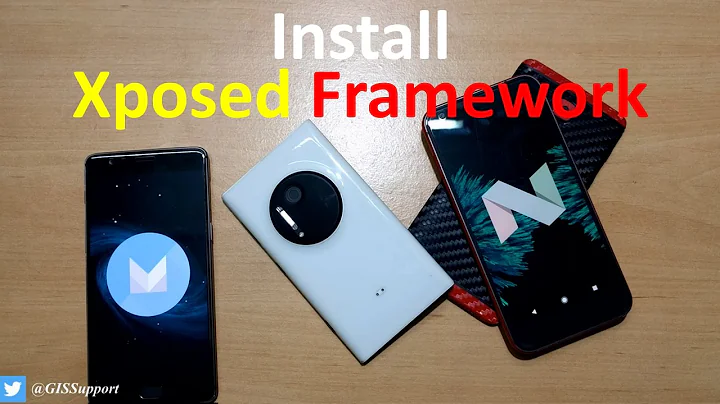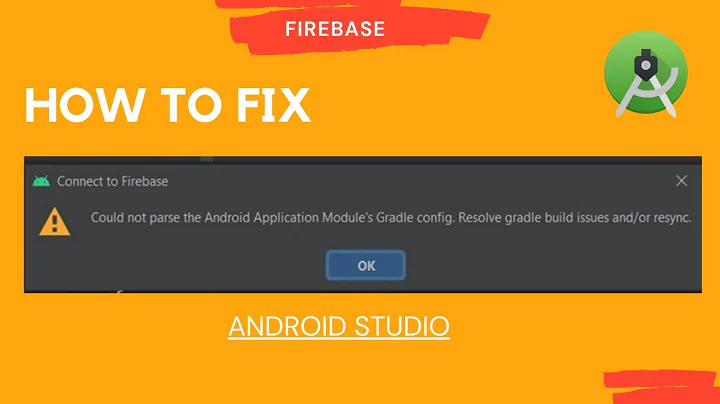Android FragmentTabHost - Not fully baked yet?
Solution 1
I finally got to the bottom of this. There is an issue with FragmentTabHost.java which will always create a TabHost element for you, no matter what you define in XML and inflate beforehand.
As such, I commented out that part of code when writing my own version of FragmentTabHost.java.
Make sure to use your new version of this in your XML layout, <com.example.app.MyFragmentTabHost
And of course inflate it:
Fragment1.java:
mTabHost = (MyFragmentTabHost) view.findViewById(android.R.id.tabhost);
mTabHost.setup(getActivity(), getChildFragmentManager(), android.R.id.tabcontent);
MyFragmentTabHost.java:
package com.example.app;
import java.util.ArrayList;
import android.content.Context;
import android.content.res.TypedArray;
import android.os.Bundle;
import android.os.Parcel;
import android.os.Parcelable;
import android.support.v4.app.Fragment;
import android.support.v4.app.FragmentManager;
import android.support.v4.app.FragmentTransaction;
import android.util.AttributeSet;
import android.view.View;
import android.widget.FrameLayout;
import android.widget.TabHost;
/**
* Special TabHost that allows the use of {@link Fragment} objects for
* its tab content. When placing this in a view hierarchy, after inflating
* the hierarchy you must call {@link #setup(Context, FragmentManager, int)}
* to complete the initialization of the tab host.
*
*/
public class MyFragmentTabHost extends TabHost
implements TabHost.OnTabChangeListener {
private final ArrayList<TabInfo> mTabs = new ArrayList<TabInfo>();
private FrameLayout mRealTabContent;
private Context mContext;
private FragmentManager mFragmentManager;
private int mContainerId;
private TabHost.OnTabChangeListener mOnTabChangeListener;
private TabInfo mLastTab;
private boolean mAttached;
static final class TabInfo {
private final String tag;
private final Class<?> clss;
private final Bundle args;
private Fragment fragment;
TabInfo(String _tag, Class<?> _class, Bundle _args) {
tag = _tag;
clss = _class;
args = _args;
}
}
static class DummyTabFactory implements TabHost.TabContentFactory {
private final Context mContext;
public DummyTabFactory(Context context) {
mContext = context;
}
@Override
public View createTabContent(String tag) {
View v = new View(mContext);
v.setMinimumWidth(0);
v.setMinimumHeight(0);
return v;
}
}
static class SavedState extends BaseSavedState {
String curTab;
SavedState(Parcelable superState) {
super(superState);
}
private SavedState(Parcel in) {
super(in);
curTab = in.readString();
}
@Override
public void writeToParcel(Parcel out, int flags) {
super.writeToParcel(out, flags);
out.writeString(curTab);
}
@Override
public String toString() {
return "FragmentTabHost.SavedState{"
+ Integer.toHexString(System.identityHashCode(this))
+ " curTab=" + curTab + "}";
}
public static final Parcelable.Creator<SavedState> CREATOR
= new Parcelable.Creator<SavedState>() {
public SavedState createFromParcel(Parcel in) {
return new SavedState(in);
}
public SavedState[] newArray(int size) {
return new SavedState[size];
}
};
}
public MyFragmentTabHost(Context context) {
// Note that we call through to the version that takes an AttributeSet,
// because the simple Context construct can result in a broken object!
super(context, null);
initFragmentTabHost(context, null);
}
public MyFragmentTabHost(Context context, AttributeSet attrs) {
super(context, attrs);
initFragmentTabHost(context, attrs);
}
private void initFragmentTabHost(Context context, AttributeSet attrs) {
TypedArray a = context.obtainStyledAttributes(attrs,
new int[] { android.R.attr.inflatedId }, 0, 0);
mContainerId = a.getResourceId(0, 0);
a.recycle();
super.setOnTabChangedListener(this);
/*** REMOVE THE REST OF THIS FUNCTION ***/
/*** findViewById(android.R.id.tabs) IS NULL EVERY TIME ***/
}
/**
* @deprecated Don't call the original TabHost setup, you must instead
* call {@link #setup(Context, FragmentManager)} or
* {@link #setup(Context, FragmentManager, int)}.
*/
@Override @Deprecated
public void setup() {
throw new IllegalStateException(
"Must call setup() that takes a Context and FragmentManager");
}
public void setup(Context context, FragmentManager manager) {
super.setup();
mContext = context;
mFragmentManager = manager;
ensureContent();
}
public void setup(Context context, FragmentManager manager, int containerId) {
super.setup();
mContext = context;
mFragmentManager = manager;
mContainerId = containerId;
ensureContent();
mRealTabContent.setId(containerId);
// We must have an ID to be able to save/restore our state. If
// the owner hasn't set one at this point, we will set it ourself.
if (getId() == View.NO_ID) {
setId(android.R.id.tabhost);
}
}
private void ensureContent() {
if (mRealTabContent == null) {
mRealTabContent = (FrameLayout)findViewById(mContainerId);
if (mRealTabContent == null) {
throw new IllegalStateException(
"No tab content FrameLayout found for id " + mContainerId);
}
}
}
@Override
public void setOnTabChangedListener(OnTabChangeListener l) {
mOnTabChangeListener = l;
}
public void addTab(TabHost.TabSpec tabSpec, Class<?> clss, Bundle args) {
tabSpec.setContent(new DummyTabFactory(mContext));
String tag = tabSpec.getTag();
TabInfo info = new TabInfo(tag, clss, args);
if (mAttached) {
// If we are already attached to the window, then check to make
// sure this tab's fragment is inactive if it exists. This shouldn't
// normally happen.
info.fragment = mFragmentManager.findFragmentByTag(tag);
if (info.fragment != null && !info.fragment.isDetached()) {
FragmentTransaction ft = mFragmentManager.beginTransaction();
ft.detach(info.fragment);
ft.commit();
}
}
mTabs.add(info);
addTab(tabSpec);
}
@Override
protected void onAttachedToWindow() {
super.onAttachedToWindow();
String currentTab = getCurrentTabTag();
// Go through all tabs and make sure their fragments match
// the correct state.
FragmentTransaction ft = null;
for (int i=0; i<mTabs.size(); i++) {
TabInfo tab = mTabs.get(i);
tab.fragment = mFragmentManager.findFragmentByTag(tab.tag);
if (tab.fragment != null && !tab.fragment.isDetached()) {
if (tab.tag.equals(currentTab)) {
// The fragment for this tab is already there and
// active, and it is what we really want to have
// as the current tab. Nothing to do.
mLastTab = tab;
} else {
// This fragment was restored in the active state,
// but is not the current tab. Deactivate it.
if (ft == null) {
ft = mFragmentManager.beginTransaction();
}
ft.detach(tab.fragment);
}
}
}
// We are now ready to go. Make sure we are switched to the
// correct tab.
mAttached = true;
ft = doTabChanged(currentTab, ft);
if (ft != null) {
ft.commit();
mFragmentManager.executePendingTransactions();
}
}
@Override
protected void onDetachedFromWindow() {
super.onDetachedFromWindow();
mAttached = false;
}
@Override
protected Parcelable onSaveInstanceState() {
Parcelable superState = super.onSaveInstanceState();
SavedState ss = new SavedState(superState);
ss.curTab = getCurrentTabTag();
return ss;
}
@Override
protected void onRestoreInstanceState(Parcelable state) {
SavedState ss = (SavedState)state;
super.onRestoreInstanceState(ss.getSuperState());
setCurrentTabByTag(ss.curTab);
}
@Override
public void onTabChanged(String tabId) {
if (mAttached) {
FragmentTransaction ft = doTabChanged(tabId, null);
if (ft != null) {
ft.commit();
}
}
if (mOnTabChangeListener != null) {
mOnTabChangeListener.onTabChanged(tabId);
}
}
private FragmentTransaction doTabChanged(String tabId, FragmentTransaction ft) {
TabInfo newTab = null;
for (int i=0; i<mTabs.size(); i++) {
TabInfo tab = mTabs.get(i);
if (tab.tag.equals(tabId)) {
newTab = tab;
}
}
if (newTab == null) {
throw new IllegalStateException("No tab known for tag " + tabId);
}
if (mLastTab != newTab) {
if (ft == null) {
ft = mFragmentManager.beginTransaction();
}
if (mLastTab != null) {
if (mLastTab.fragment != null) {
ft.detach(mLastTab.fragment);
}
}
if (newTab != null) {
if (newTab.fragment == null) {
newTab.fragment = Fragment.instantiate(mContext,
newTab.clss.getName(), newTab.args);
ft.add(mContainerId, newTab.fragment, newTab.tag);
} else {
ft.attach(newTab.fragment);
}
}
mLastTab = newTab;
}
return ft;
}
}
Solution 2
I think, it was a mistake to set method initFragmentTabHost() to constructor. At that time TabHost don't his children - it happens after. LinearLayout, for example, work with his children in onMeasure() method (grepcode). ViewGroup in constructor just init variables, and set mChildrenCount = 0 (grepcode).
All what I can did, it's only costumize FragmentTabHost:
<android.support.v4.app.FragmentTabHost xmlns:a="http://schemas.android.com/apk/res/android"
a:id="@android:id/tabhost"
style="@style/Widget.TabHost"
a:inflatedId="@+id/content" />
And costumize Tabs (have problems with tab heights, I solve them in code):
<LinearLayout xmlns:a="http://schemas.android.com/apk/res/android"
style="@style/Widget.Tab" >
<TextView
a:id="@android:id/title"
style="@style/Widget.TabTitle" />
</LinearLayout>
In code:
tabSpec = mTabHost.newTabSpec(tag).setIndicator(createTab(caption));
...
private View createTab(CharSequence title) {
final View v = View.inflate(getActivity(), LAYOUT_TAB, null);
((TextView) v.findViewById(android.R.id.title)).setText(title);
return v;
}
I think other customization with TabWidget we can do only with programmatically manipulating, like this:
final View tabs = (TabWidget) mTabHost.findViewById(android.R.id.tabs);
final ViewGroup parent = (ViewGroup) mTabHost.getChildAt(0);
parent.removeView(tabs);
parent.addView(tabs);
IMHO, this is not good.
Related videos on Youtube
jamis0n
Updated on September 15, 2022Comments
-
jamis0n over 1 year
I wanted to see if anyone has had success with customization of tabs using FragmentTabHost that comes with the new Android API level 17.
I was excited to be able to nest a tabHost within my ViewPager SherlockFragments, but I'm having trouble doing simple things like moving the tabs to the bottom or changing the layout of the tabs.
Has anyone seen a good example of using this functionality?
This is the only example I could find in the Android docs, and theres just about nothing that describes its use. It also seems to ignore whatever is defined in the layout for
R.id.fragment1.My question I suppose would be if anyone has come across a good tutorial re:FragmentTabHost or if they have an idea about how to a) put the nested tabs at the bottom or b) change the layout of said tabs.
I've tried all the usual methods, but since it appears the XML layout file is overridden, I haven't had much luck.
private FragmentTabHost mTabHost; @Override public View onCreateView(LayoutInflater inflater, ViewGroup container, Bundle savedInstanceState) { setContentView(R.layout.fragment_tabs); mTabHost = (FragmentTabHost)findViewById(android.R.id.tabhost); mTabHost.setup(this, getSupportFragmentManager(), R.id.realtabcontent); mTabHost.addTab(mTabHost.newTabSpec("simple").setIndicator("Simple"), FragmentStackSupport.CountingFragment.class, null); mTabHost.addTab(mTabHost.newTabSpec("contacts").setIndicator("Contacts"), LoaderCursorSupport.CursorLoaderListFragment.class, null); mTabHost.addTab(mTabHost.newTabSpec("custom").setIndicator("Custom"), LoaderCustomSupport.AppListFragment.class, null); mTabHost.addTab(mTabHost.newTabSpec("throttle").setIndicator("Throttle"), LoaderThrottleSupport.ThrottledLoaderListFragment.class, null); return mTabHost; }After doing some research, it appears there may be a glitch with initializing the FragmentTabHost in the support library. The user here on Google code has provided a suggestion to this:
FragmentTabHost.java
private void initFragmentTabHost(Context context, AttributeSet attrs) { TypedArray a = context.obtainStyledAttributes(attrs, new int[] { android.R.attr.inflatedId }, 0, 0); mContainerId = a.getResourceId(0, 0); a.recycle(); super.setOnTabChangedListener(this); // If owner hasn't made its own view hierarchy, then as a convenience // we will construct a standard one here. /***** HERE COMMENT CODE BECAUSE findViewById(android.R.id.tabs) EVERY TIME IS NULL WE HAVE OWN LAYOUT ******// // if (findViewById(android.R.id.tabs) == null) { // LinearLayout ll = new LinearLayout(context); // ll.setOrientation(LinearLayout.VERTICAL); // addView(ll, new FrameLayout.LayoutParams( // ViewGroup.LayoutParams.FILL_PARENT, // ViewGroup.LayoutParams.FILL_PARENT)); // // TabWidget tw = new TabWidget(context); // tw.setId(android.R.id.tabs); // tw.setOrientation(TabWidget.HORIZONTAL); // ll.addView(tw, new LinearLayout.LayoutParams( // ViewGroup.LayoutParams.FILL_PARENT, // ViewGroup.LayoutParams.WRAP_CONTENT, 0)); // // FrameLayout fl = new FrameLayout(context); // fl.setId(android.R.id.tabcontent); // ll.addView(fl, new LinearLayout.LayoutParams(0, 0, 0)); // // mRealTabContent = fl = new FrameLayout(context); // mRealTabContent.setId(mContainerId); // ll.addView(fl, new LinearLayout.LayoutParams( // LinearLayout.LayoutParams.FILL_PARENT, 0, 1)); // } }XML Layout for fragment:
<android.support.v4.app.FragmentTabHost xmlns:android="http://schemas.android.com/apk/res/android" android:id="@android:id/tabhost" android:layout_width="match_parent" android:layout_height="match_parent"> <LinearLayout android:orientation="vertical" android:layout_width="match_parent" android:layout_height="match_parent"> <FrameLayout android:id="@android:id/tabcontent" android:layout_width="0dp" android:layout_height="0dp" android:layout_weight="0"/> <FrameLayout android:id="@+id/realtabcontent" android:layout_width="match_parent" android:layout_height="0dp" android:layout_weight="1"/> <TabWidget android:id="@android:id/tabs" android:orientation="horizontal" android:layout_width="match_parent" android:layout_height="wrap_content" android:layout_weight="0"/> </LinearLayout> </android.support.v4.app.FragmentTabHost>













